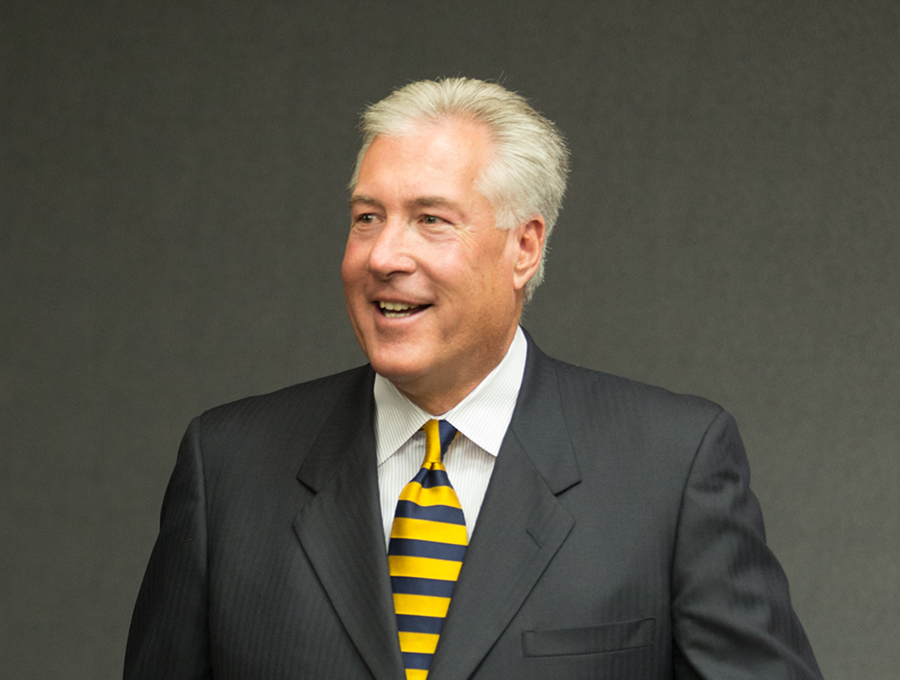Leadership, work ethic and passion are keys to catching recruiter’s eye, says former Dell VP and General Manager
November 1, 2013
|
Mays Business School
When David Lockett went to register for freshman classes at G. Rollie White Coliseum in the fall of 1972, an employee in the Registrar’s Office made a comment that proved to be both sobering and motivating. “He looked in my file and saw my modest record of academic achievement in high school and said to me, “I’m sure glad you can throw a baseball,'” recalls Lockett, who had earned a baseball scholarship to Texas A&M. “I remember feeling fear and being a little bit intimidated by those words, but that was probably a good thing at that point in my life.”
Lockett was able to channel those emotions into a successful professional career that led him through stints at Texaco and Wang Laboratories before embarking on his 21-year career at a fledgling computer manufacturer called Dell, Inc. in 1991. He spent much of his first few years at Dell traveling from coast to coast, interviewing candidates for a variety of positions in an effort to keep pace with the company’s rapid growth.
In 1993, Lockett was asked to serve as vice president for Dell’s Small and Medium Business division. In that role, he grew annual revenues from $100 million to $7 billion over a 15-year period while overseeing a staff of more than 2,500 managers and sales representatives in three geographic locations. Lockett also implemented new online sales ordering functionality that revolutionized the way Dell reached its customers. From 2008 to December 2012, Lockett served as vice president and general manager of Dell’s $3.5 billion Software & Peripherals business. He was handpicked to turn around an underperforming division of five business units to meet the financial goals and growth targets defined by the three-year plan. Through it all, hiring the right people—and lots of them—was a constant challenge.
Lockett recently shared several lessons learned from his professional experiences and career advice with Mays students in the Undergraduate Honors Program.
“I always look for evidence of leadership and work ethic in candidates’ resumes as well as the passion with which they “pitch’ themselves during interviews,” he notes. “Those three things tell me more about a person than his or her GPA or SAT score.”
Lockett says that leadership can be expressed many ways, including serving as an officer for student clubs or organizations or spearheading community service activities. Work ethic shines through in how students spend their time outside the classroom. “When a student carries a full class load every semester, works at a job during the school year and over the summer, and still graduates in four years, it tells me that person is not scared of hard work,” he notes.
Just as important as the resume, Lockett says, is an individual’s ability to deliver a persuasive sales pitch during an interview. “I want candidates to tell me what my company will get if we hire them.”
Rusty Hundley ’16, a business honors major, says he learned a lot from Lockett’s talk, including what companies look for when they hire people as well as the different factors and decision-making processes that go into major business transactions. “Mr. Lockett helped me understand what goes through an interviewer’s mind while reading a resume and during an interview. That was very insightful, and it was interesting listening to him talk about his perspective on the leveraged buy-out that Dell just went through.”
Lockett also reminded students of the importance of presenting themselves in a professional manner on social media sites like Facebook and LinkedIn. “That’s the first place recruiters go today to filter out candidates.”
Lockett says finding a profession that you’re passionate about is the most important thing. “You can never fake passion, and if you find that good fit early in your career, you won’t mind working long hours and paying your dues to achieve your professional goals.”
Lockett also encouraged the students to use their Aggie rings. “There’s nothing wrong with using the network to expand your sphere of contacts,” he emphasizes. “In today’s competitive job market and tight economy, those connections are more important than ever.”
About Mays Business School
Texas A&M University’s Mays Business School educates more than 5,000 undergraduate, master’s and doctoral students in accounting, finance, management, management information systems, marketing and supply chain management. Mays consistently ranks among the top public business schools in the country for its undergraduate and MBA programs, and for faculty research. The mission of Mays Business School is creating knowledge and developing ethical leaders for a global society.



